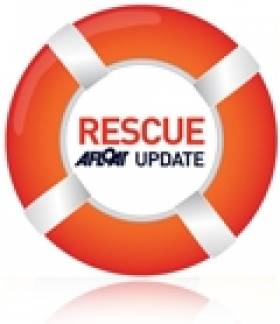Displaying items by tag: Personal Flotation Devices
#MCIB - The families of two fishermen found dead at sea off the Skerries last April may never uncover the circumstances that led to their demise. But the official report into the incident indicated that the absence of lifejackets was a significant contributing factor.
Ronan Browne (26) and David Gilsenan (41) were reported missing on the evening of 1 April after failing to return from a trip tending to lobster pots.
Their vessel, Lady Linda, was found the following morning upturned in an oil slick off Clogherhead with no sign of the crew.
It wasn't until a week later that their bodies were discovered caught in the vessel's fishing gear some five miles east of Clogherhead, as previously reported on Afloat.ie.
Post-mortem results found that both men died from drowning, with Gilsenan also showing signs of hypothermia.
With no eyewitnesses to the incident, the report by the Marine Casualty Investigation Board (MCIB) indicated a number of possible causes from eqiupment malfunction or shifting of lobster pots on deck, to the wave height and weather conditions on the day, which were reportedly deteriorating when the boat left port.
It also said that Browne and Gilsenan "were lifelong friends, both men were experienced and qualified marine engineers in the fishing vessel industry. Both men were experienced in boat handling and fishing and had worked together on many occasions."
But the report emphasised the lack of personal flotation devices (PFDs) on board, and noted that emergency equipment was stored under the deck and not easily accessible.
The MCIB's recommendations include a review of the code of practice for fishing vessels under 15m to establish "revised stability critera" and ensuring that all boats are fitted with automatic radio beacons that deploy upon capsize.
In a separate incident, lack of proper maintenance led to an unlicenced boat taking on water off Co Kerry last August.
The Claire Buoyant was carrying one crew, five passengers and 21 sheep from Beginish Island to Ventry when the vessel began to lose stability.
Skipper Eoin Firtear - who the MCIB described as having "limited sea-going experience" - and his five passengers were rescued by passenger ferry. All sheep were jettisoned overboard, with 18 eventually recovered.
The report reminded that the carriage of livestock should only be undertaken in appropriately certified vessels.
- MCIB
- Marine Casualty Investigation Board
- report
- Lady Linda
- Clogherhead
- Ronan Browne
- David Gilsenan
- lobster pots
- Fishing
- drowning
- hypothermia
- missing
- malfunction
- wave height
- Weather
- lifejackets
- Personal Flotation Devices
- PFDs
- Code of Practice
- stability
- Radio
- beacon
- maintenance
- unlicenced
- Co Kerry
- Claire Buoyant
- Sheep
- Passengers
- Beginish Island
- Ventry
- Eoin Firtear
- Skipper
- Rescue
- Livestock
1,499 Lives Lost in Ten Year Tragic Tide of Drownings
Irish Water Safety is calling for people to be more aware of the dangers presented by water based activities and wants the general public to know that there are many reasons people drown which are not simply limited to warmer weather risk taking. People have a responsibility to themselves and family to stay safe around water by knowing the dangers and learning from the lessons offered by the 1,499 person's lives tragically lost in a ten year period.
A synopsis of some general contributory factors over the years
1. Poor or inadequate equipment (e.g. boats or lifejackets);
2. Alcohol consumption;
3. Falling unexpectedly into water ;
4. Improper use of boats and equipment;
5. Overestimation of skills;
6. Lack of local knowledge when travelling in Ireland and abroad;
7. Not being able to swim;
8. Easy unauthorised access to waterways;
9. Cold;
10. Current (including rip currents, river currents, and tidal currents);
11. Offshore winds (including flotation devices);
12. Pre-existing diseases (e.g. heart attacks);
13. Underwater entanglement;
14. Bottom surface gradient and stability;
15. Waves (coastal, boat);
16. Water transparency;
17. Impeded visibility (including coastal configuration, structures and overcrowding);
18. Lack of parental supervision (infants and children);
19. Change in weather conditions;
20. Excessive 'horseplay' or over exuberant behavior (including "tombstoning" from cliffs);
21. Swimming outside the depth of the user.
22. Suicide and Homicide
A synopsis of some general preventive and management actions
1. Public education by Irish Water Safety regarding hazards and safe behaviours;
2. Teaching children to stay away from water when unsupervised through the IWS PAWS (Primary Aquatics Water Safety) programme;
3. Continual adult supervision of children;
4. IWS media campaigns that drowning can happen quickly and quietly;
5. Promote in IWS press announcements, the restriction of alcohol provision before or during aquatic activities;
6. Provision by Irish Water Safety of properly trained and equipped lifeguards;
7. Provision of rescue services;
8. Irish Water Safety Risk Assessments that include assessments of local hazard warning notices, access to emergency response and availability of resuscitation skills/facilities and other factors;
9. Development by Irish Water Safety of rescue and resuscitation skills among general public and user groups;
10. Coordination by Irish Water Safety with user group associations concerning hazard awareness and safe behaviours;
11. Wearing of adequate lifejackets and Personal Flotation Devices when boating;
12. Fencing and doors to isolate outdoor pools, slurry pits, rivers on farms and other water features near populations.
The 20% decrease in the number of incidents involving leisure and recreational activities to which the Irish Coast Guard had to respond can be accounted for in no small part by the increase in the general public's awareness of water safety best practices. The change in culture on our aquatic environment is comparable to that which saw a huge increase in the wearing of seatbelts in cars over the last two decades. The huge increase in the number of people taking to water-based activities in the last decade saw the culture shift progressively towards a responsibility among the public to wearing lifejackets when taking to water based activities.




























































